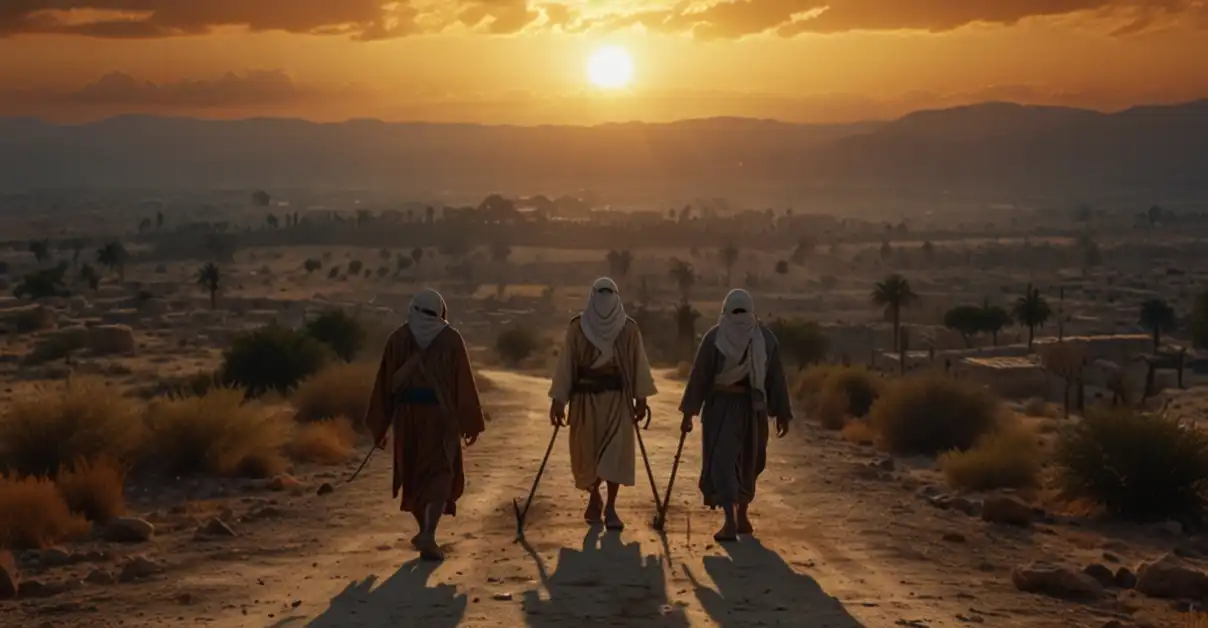The narrative involving four lepers in 2 Kings 7 contains important lessons centered on faith, courage, and God’s intervention. The lepers decide to approach the Syrian army during a desperate famine scenario in Samaria. Their decision profoundly exemplifies purpose-driven, courageous action. Their discovery of food demonstrates timely intervention, while their actions foster hope and redemption for those in desperate situations.
The story also has lessons for modern readers. It gives motivation to make courageous decisions and to trust in God’s timing. The lepers offer a guide to properly channeling one’s faith during hard times, knowing there exists a possibility of divine intervention that can change dire circumstances into matters of growth and rescue.
Life Lessons from the Four Lepers
In the account of the siege of Samaria in 2 Kings 7, we meet four lepers whose story is one of inspiration and noteworthy significance. It combines all three of those elements: faith, courage, and divine intervention. The reasons they ended up in the city stem from the famine that was prevailing in their city along with other rheumatic issues associated with starving, which caused great desperation to the people. These spatial lepers stricken with this disease made an attempt that was self-destructive and was socially deemed unhelpable. It didn’t work out the way they thought it would, and it turned out saving a city that so desperately needed help.
The story of 2 Kings 7 has a unique set of teachings and offers undoubtedly valuable biblical wisdom, especially in the face of trials and challenges. These ancient lessons serve as a beacon of guidance to help with today’s hurdles, enabling people to confront and channel any diversity they are faced with. These teachings of lepers make an individual look at every single possibility with undiverted focus and aim straight ahead the moment assistance is not visible. Such instances highlight the need to place faith in the omniscient rationality of a higher power surrounding the premise of self-dependence and taking ground actions.
Historical Context of the Story
To grasp the critical importance of the story of the four leprous men, we need to examine the background of the events described in 2 Kings 7. In the period under consideration, the capital of the northern kingdom of Israel, Samaria, was being besieged by the Syrian army. People from Samaria were experiencing a terrible famine, which resulted in pain and suffering beyond imagination as even the most basic food commodities were unavailable. Israel’s King Jehoram was in despair, and the likelihood of a solution looked bleak.
It is within this very setting that we are introduced to the four lepers who, because of their sickness, were cast off from the rest of society. Lepers used to be housed in special quarters away from a city as they were compelled to live in solitude. Their medical situation made them prone not only to ailments but to social rejection as well.
Considering the famine, the four lepers became aware of the fact that leper colonies were not safe havens either. Their dilemma embodies the kind of faith and decisive action mentioned in Lessons from Joseph from the Bible, where adversity meant trusting God’s plan and making bold moves to ensure survival.
Understanding the lepers’ social status aids in explaining the precise social context in which desperation approached their emotions.
The Social Status of the Lepers
Israelites considered leprosy a disease and social identity in its particular context in ancient Israel. As the biblical purity laws state, the afflicted were deemed unclean and consequently segregated from the rest of society. The laws residing in the heart of these communities sought to capture illness and contain it, hence instructing lepers to dwell beyond the city walls marked by rampant neglect and exclusion.
The outbreak of the four lepers in 2 Kings 7 marks the epitome of social isolation, both emotionally and physically. Social acceptance has left their caption blank, making them adrift in limbo devoid of all identity markers and frameworks. This struggle is emblematic of the state where so many are left feeling ostracized—feeling alone in the fight against disease or being left entirely outside the societal picture.
While wrought in aloofness, the lepers’ decision to take the matter into their own hands captures the sheer strength of the human will, reminding us where we often unquestioningly forget: that even those on society’s fringes have the potential to set off ripples that change the tide of life across the planet.
Their Decision to Act
While contemplating their tragic situation, the four lepers came to a conclusion: instead of waiting for death to arrive through starvation or disease, they would take a chance and approach the Syrian army. Out of despair, these lepers made a choice that was also courageous. With nothing to lose, they made the choice to believe that there was still a possibility of a miracle that would change the course of their life.
It is their courage that is the most compelling part of this narrative. The very fact that the lepers decided to trust in God and take the step towards the uncertainty is worth learning. It demonstrates the value of risk-taking action without complete certainty of success and the idea that faith does not mean waiting for change but actively pursuing steps that, although daunting, can be decisive.
The Miraculous Provision
Incredible events are about to unfold with the story of the four lepers. As the lepers were getting closer to the Syrian camp, God had started working in their hearts. The Syrians were led to believe, because of the noise generated by the chariots and horses, that the Israelites had mercenaries fighting on their side. Out of sheer fright, they abandoned all their supplies and fled the camp. The four lepers were the first to reach the camp, and to their surprise, it was filled with food, clothing, and valuables.
Loud noises in the desert, given it was previously deserted, turned out to have miracles in abundance. This once ‘impossible’ given scenario for the lepers had greatly turned into their rescue. Merely a few moments prior, starving and isolated, they now were the citizens of hope and food. The incident here exemplifies forceful reminders of God’s work and the hope he provides, turning every human expectation upside down. This model of a case also gives food for thought on how will and faith help one receive god’s intentions; sometimes it’s the magnanimous decision that one assumes that becomes the centerpiece of divinity.
The Theme of Redemption
The tale of the four lepers also unfolds as a chronicle of redemption. These men, who were outcast from society, literally brought an entire city on the verge of collapse back from the brink of death and were hence able to redeem themselves. The lepers took it upon themselves to tell the people of Samaria about the good news that the Syrian army had decided to abandon the siege, which eventually led to the salvation of Samaria. Their redemption is both spiritual and physical in nature. Physically they were given food and income, while spiritually they helped restore a community that was in shambles.
This, the four lepers symbolize the grace of God. Their story is a testament to God’s abundant mercy. These mercies prove that no matter how dire the circumstance may be, there always exists a solution, and eternally even the most unreachable people can be utilized for nourishing hope and change.
Overcoming Fear and Uncertainty
Facing extremely high levels of fear and uncertainty is what these four lepers experienced when they decided to leave the citizen’s safety net and head towards the enemy camp. The lepers did not know what awaited them, but they decided to face their fears. Their teachings highlight the importance of taking a stand even when the outcome seems indistinct during attempts.
Most people find themselves grappling with some sort of life-obstructing fear. Overcoming fear is a challenge that many face on a daily basis. May it be entering a new phase of life, dealing with a crisis, facing a medical issue, or coming to terms with aging—all of these can feel insurmountable at times. The four lepers remind us that sometimes, courage is what is needed to break through.
The Power of Faith and Action
Faith without action is akin to leaping into a chasm without a bridge. The story of the four lepers reminds us of the necessity of believing something and also acting on it—faith and action. Often we hear that one should have faith in God, who saves us from situations where we have been struck down. While that is in fact true, it is equally true that faith alone does not resolve anything unless steps in action are taken, and the lepers are a perfect reminder of precisely that.
The story actually is more about the courageous steps lepers took than an intervention. These steps guided the lepers to victories over their obstacles, which in turn bestowed upon them the courage required to forge forward. And that, my friend, is true power.
Applying the Lessons to Modern Life
In today’s society, many individuals encounter problems that are truly beyond their control. Whether it is personal adversity with crisis management or overcoming self-imposed challenges, the four lepers provide critical insights for all of us. The importance of faith, courage, and making bold choices is central to the story when it comes to the situations in which we find ourselves.
Crisis brings forth challenges. With the application of faith, we can face approaches with a resilient mindset. The four lepers remind us of the fact that there is always some hope regardless of how bad a situation might seem, and at times, the most difficult decisions lead to profound change.
Conclusion
In 2 Kings 7, the story of the four lepers demonstrates faith, courage, and divine guidance. The decision to take what many considered to be an impossible action illustrates the age-old principle of trusting God to provide and then stepping out in faith. They showed undying hope of overcoming rejection. Their journey, which seemed bleak at first, inspires faith in everyone facing struggles and shows that even in the most desperate situations, there is always the possibility of miraculous salvation.
While contemplating the many lessons we can learn from the four lepers, we reflect on how we as individuals can be challenged or inspired to do more. May we be able to face our fears, trust in God’s timing, act boldly, and know that faith will lead to redemption and provisions.

Hi, I’m Sitara. Writing is my way of connecting with the world and expressing the thoughts that swirl in my heart and mind. At 23, I find myself constantly inspired by the beauty of spirituality, the complexities of love, and the lessons life teaches us every day. My words are a reflection of my journey—raw, honest, and deeply personal. I hope my stories and reflections resonate with you, offering comfort, inspiration, or simply a moment of quiet introspection.
Thank you for being here and sharing this space with me. Let’s explore the depths of life together.




